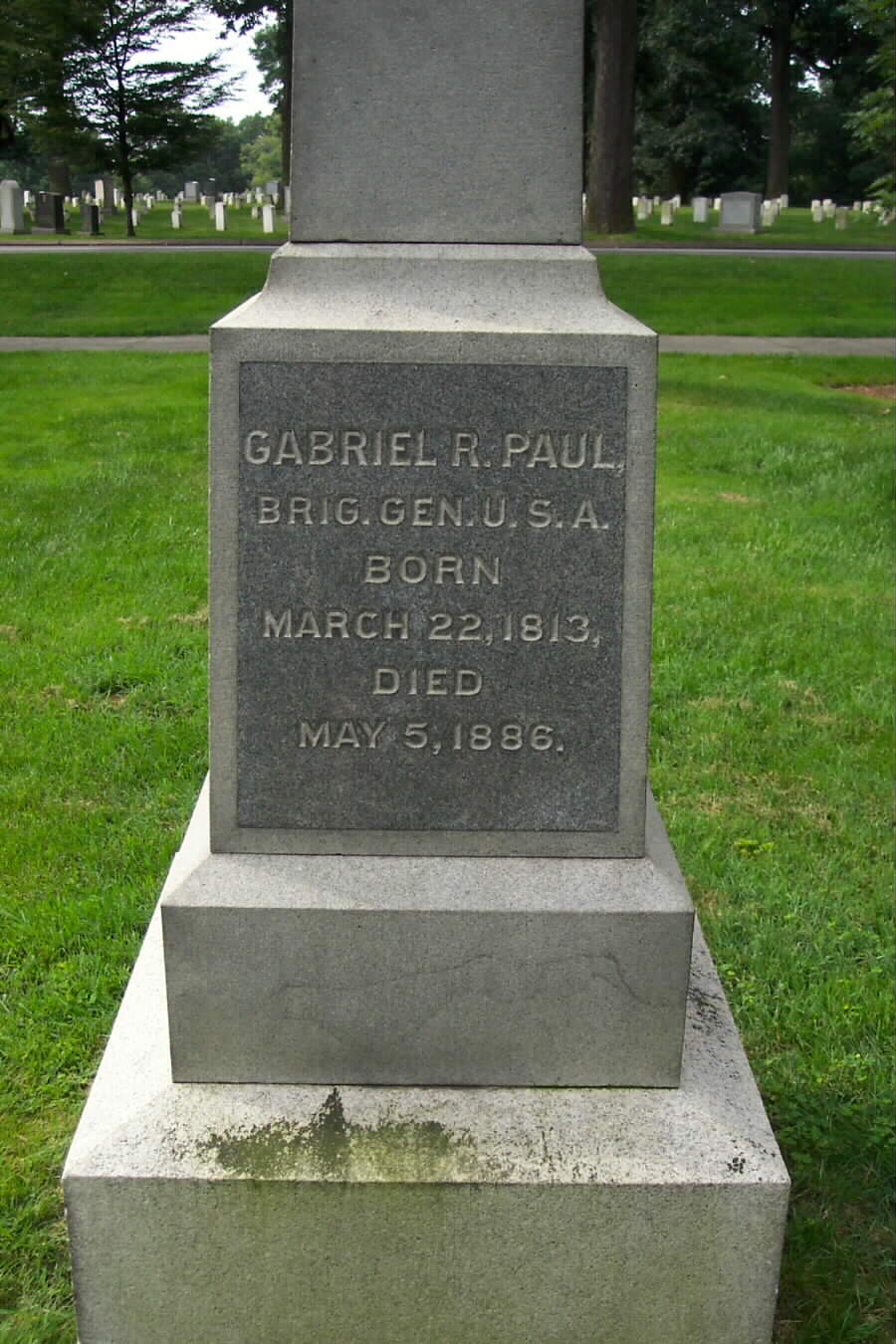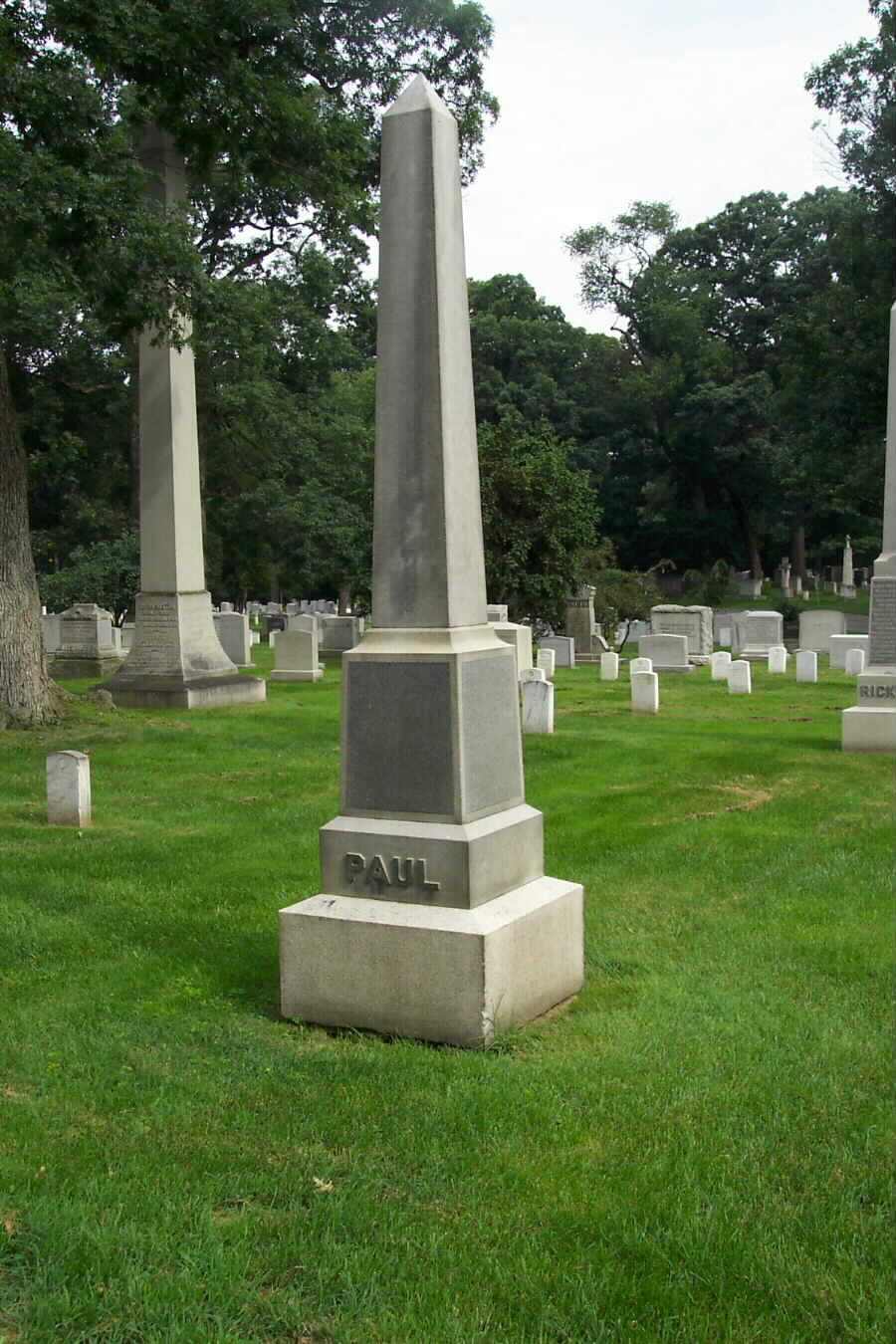Gabriel Rene Paul, soldier, born in St. Louis, Missouri, 22 March, 1813; died in Washington, D. C., 5 May, 1886.
He was graduated at the United States Military Academy in 1834, made First Lieutenant in the 7th United States Infantry, 26 October, 1836, and served in the Florida war in 1839-’42, surprising a camp of Seminole Indians near Tampa bay in the latter year.
He was commissioned Captain, 19 April, 1846, took part in the Mexican war, was wounded at the battle of Cerro Gordo, and brevetted Major for gallant conduct at Chapultepec, where he led the storming party that captured the enemy’s flag.
The following year he was presented with a sword by the citizens of St. Louis, Missouri, for his services in Mexico. In an expedition to Rio Grande river, Texas, in 1852, he took part in the capture of a band of desperadoes, and on 2 October, 1858, he surprised and took a camp of hostile Indians on Spanish Fork, Utah. Later he was promoted Major of the 8th United States Infantry, became colonel of the 4th New Mexico volunteers, and did good service in keeping the Confederates out of that territory. He was acting inspector-general of the Department of New Mexico till December, 1861, subsequently in command of the southern military district, and on 13 April, 1862, engaged in skirmish with the enemy at Peralta. He was made Lieutenant Colonel on 25 April, Brigadier General of volunteers, 18 April, 1863, and colonel, 13 September, 1864. He was present at Fredericksburg, Chancellorsville, and Gettysburg, in which latter engagement he was deprived of the sight of both eyes by a rifle-ball. In the following November he was presented by the 29th New Jersey volunteers with a jewelled sword for his services in that battle.
General Paul was on sick-leave until 16 February, 1865, served as deputy-governor of the Soldiers’ home near Washington, D. C., till 13 June of that year, and was in charge of the military asylum at Harrodsburg, Kentucky, till 20 December, 1866. He was retired from active service, 16 February, 1865, on account of his blindness, and on the 23d of the same month he was brevetted Brigadier General, United States Army, for gallant conduct at the battle of Gettysburg. In December, 1866, congress granted him the pay and allowances attaching to the full rank of brigadier-general. On 10 December, 1886, a monument erected to the memory of General Paul in the Arlington, Virginia, Cemetery, by his comrades of the Grand army of the republic, was dedicated with appropriate ceremonies.
His son, Augustus Chouteau, soldier, born in Albany, New York, 16 April, 1842, was a Cadet at the Kentucky military institute in 1861. In May, under the call for three months’ troops, he enlisted and was made Captain of Kentucky mounted infantry. He was mustered out in the following August, but entered the army again as captain in the 23d Kentucky volunteers, his commission bearing date 2 January, 1862. He took part with his regiment in the campaigns of the Armies of the Ohio and the Cumberland until 1 June, 1863, when he was appointed assistant adjutant-general of Volunteers. In this capacity he served with the Army of the Potomac on the staffs of General Henry Baxter and General Andrew A. Humphreys, and on that of Byron R. Pierce. During this period Colonel Paul took part in the battles of the Wilderness, Spottsylvania Court-House, etc., was captured by the enemy, spent eleven months in Confederate prisons, and was among those officers that were placed by the Confederates under the fire of National guns at Charleston, South Carolina He was brevetted major for gallantry in the Wilderness, and lieutenant-colonel for meritorious conduct at Spottsylvania Court-House. He was mustered out, 19 September, 1865. On 11 May, 1866, he was appointed 2d lieutenant in the regular army, but declined. He subsequently accepted the same rank in the 3d cavalry, and was promoted 1st lieutenant, 20 December, 1872. During the next twelve years Colonel Paul saw arduous service on the western frontier. In May, 1881, his health became so impaired that he resigned his commission.
Gabriel Rene Paul was the grandson of a Napoleonic officer who is said to have built first house in St Louis. Although G. W. Cullum makes this statement, it is difficult to credit, since the city was fully settled a generation before Napoleon achieved fame. He was born in that city, Mar 22, 1813 , and graduated from the United states Military Academy at West Point in the Class of 1834. Most of his duty, preceding Mexican War, was in the Southwest and against the Seminoles in Florida.
During war with Mexico won the brevet of Major for gallant service at the storming of Chapultepec, a feat for which he was later presented with a sword by citizens of St. Louis. He was next stationed on the Indian frontier and regularly promoted to Major of the 8th Untied States Infantry, April 22, 1861, while stationed at Albuquerque as acting Inspector General of the Department of New Mexico. In December he was appointed Colonel of the 4th New Mexico Infantry, a battalion which later merged into the 1st New Mexico Cavalry. The following Spring, while in command of Fort Union and the District of Southern New Mexico, he backed up field commanders who repelled the invasion led by Henry Sibley in his abortive attempt to win the territory for the Confederacy. In April he was pro Lieutenant Colonel of the 8th United Sates Infantry, and on September 5, Brigadier General of Volunteers, an appointment which expired the following March for lack of confirmation by the Senate. He was reappointed on April 18, 1863, and duly confirmed.
An offhand remark by Lincoln in a note in his own handwriting dated August 12, 1862, states: “Today Mrs. Major Paul calls and urges appointment of her husband as a Brigadier. She is a saucy woman and will keep tormenting me until I may have to do it.” This traduces him and has caused historians to contend that Mrs. Paul’s persistence rather than his merit won him promotion. The sketch of him refutes the calumny.
He commanded Brigade of four 4 New York regiments in Doubleday’s Division of I Corps at Fredericksburg and five New Jersey regiments of the same Corps at Chancellorsville. Pn the first day of battle of Gettysburg, when I Corps was all but destroyed and its Commander killed, Paul, who was commanding a brigade of John C. Robinson’s Division, was severely wounded by a rifle ball which entered his right temple and passed out through left eye. He was totally blinded and senses of smell and hearing were greatly impaired. For gallantry in attempting to rally a fragment of his command on this occasion, the 29th New Jersey presented him, blind and disabled although he was, with a “magnificent jeweled sword.”
After partial recovery he attempted to discharge some nominal administrative duties, but was placed on the retired list as a Brigadier General, February 16, 1865. He died at Washington, D.C. on May 5, 1898 and was buried with full military honored in Section 1, Grave 16, of Arlington National Cemetery.
Michael Robert Patterson was born in Arlington and is the son of a former officer of the US Army. So it was no wonder that sooner or later his interests drew him to American history and especially to American military history. Many of his articles can be found on renowned portals like the New York Times, Washingtonpost or Wikipedia.
Reviewed by: Michael Howard


